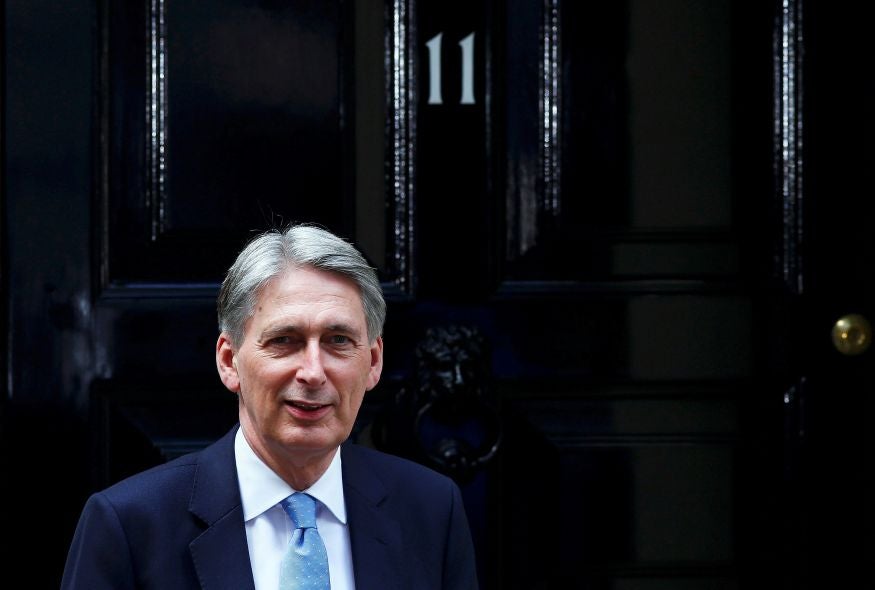Philip Hammond signals ‘highly skilled’ workers will be exempt from curbs to free movement of people
‘We could certainly facilitate the movement of highly skilled people between financial institutions and businesses in order to support investment in the UK economy’

Your support helps us to tell the story
From reproductive rights to climate change to Big Tech, The Independent is on the ground when the story is developing. Whether it's investigating the financials of Elon Musk's pro-Trump PAC or producing our latest documentary, 'The A Word', which shines a light on the American women fighting for reproductive rights, we know how important it is to parse out the facts from the messaging.
At such a critical moment in US history, we need reporters on the ground. Your donation allows us to keep sending journalists to speak to both sides of the story.
The Independent is trusted by Americans across the entire political spectrum. And unlike many other quality news outlets, we choose not to lock Americans out of our reporting and analysis with paywalls. We believe quality journalism should be available to everyone, paid for by those who can afford it.
Your support makes all the difference.Chancellor Philip Hammond has signalled that highly skilled workers, including bankers and businessmen, will be exempt from the government’s curbs to immigration after Britain leaves the EU.
In his debut appearance in front of the Lords’ Economic Committee – and less than 24 hours after Theresa May said she would not be providing a “running commentary” on Brexit negotiations – Mr Hammond appeared to reassure the financial markets by revealing preferential treatment for “highly skilled” people.
When asked how he would deal with the “interesting” paper dispatched by the Japanese government on Sunday, ahead of the G20 meeting in China, Mr Hammond responded: “It’s clearly in our interests, and I would suggest the European Union’s interest as well, to have as free and open access to each others markets… but we cannot accept uncontrolled free movement of people – that’s the political outcome of the referendum decision that was made.
“I don’t think that needs to strike fear into the heart of Japanese financial institutions because I would expect, due to the control that we would have over movement of people, we would use it in a sensible way that would certainly facilitate the movement of highly skilled people between financial institutions and businesses in order to support investment in the UK economy – that would certainly be my expectation.”
But while the Government appears happy to signal bankers would be exempt from the curbs to the free movement of people, Ms May is yet to reassure EU migrants, living within the UK, whether their legal status will remain the same following Britain’s exit from the EU. She has repeatedly said she will not give such guarantees before the EU member states enshrine the rights of British citizens living in the EU.
Mr Hammond’s appearance at the Lords’ committee, which included two former chancellors, Alistair Darling and Norman Lamont, comes after he met with a delegation of City financiers at the Treasury on Tuesday to hear their fears about Brexit. “I understand the scale of the potential impact leaving the EU could have for parts of the financial services industry,” the Chancellor stated after the meeting. “That is why I am determined to listen to what the industry has to say on key issues, like access to the single market.”
The Chancellor, who announced the autumn statement will be on the 23 November, also used the committee session to warn European leaders not to damage the City’s role as Europe’s financial centre once Britain leaves the EU. He insisted that he had “no doubt whatsoever” that Britain’s agreement will be “bespoke”.
Mr Hammond added that the economic impact of the vote to quit the EU had been “considerably less severe” than the Bank of England had expected but warned there were likely to be ups and downs over the coming years. He told the House of Lords Economic Affairs Committee: “There are very good reasons to think that it is in the interests of the overall economies of the European Union countries, as well as the UK economy, that London, as Europe's financial centre, remains broadly as it is.
“The structures that we have in London, its very complex eco-system of banks, funds, insurance companies, law firms, business services firms, would not and could not be replicated anywhere else.
“To break it up or to try to damage it in the pursuit of some very narrow and hypothetical national advantage would be a huge mistake for any of our European Union partners to follow.
“I genuinely believe that London delivers not only for the UK but for the European Union as a whole.”
Join our commenting forum
Join thought-provoking conversations, follow other Independent readers and see their replies
Comments